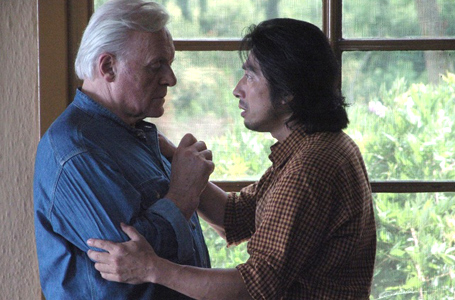
Metwally plays Omar, a PhD candidate whose ticket to an unhappy and bleak future in academia lies in writing the biography of one South American wunderkind author who died tragically young and by his own hand. His obstacles are his pushy and controlling girlfriend and colleague (Lara) who really wants him in academia, and also the dead author’s menagerie of surviving relations who look forward to living off their dead relation’s legacy but may not want to live with their secrets exposed – a resentful spurned wife (Linney), a young mistress (Gainsbourg), a decrepit elder brother (Hopkins) who keeps a paramour two decades his junior (Sanada).
The film only begins in earnest when Omar shows up uninvited at their mansion in Uruguay. Not much happens as can be expected from the protagonist’s wishy-washy and spineless nature but it’s perfect as a device to paint convincing, fascinating, and deep character portraits of the members of the household. For long-time Merchant-Ivory fans, this is what they’ll be paying to watch in the cinema. For the rest of us audiences, the fun begins when we realise how each ‘unlikeable’ character informs us about Omar’s own predicament. The only thing missing here is a script that makes full use of the protagonist’s lack of self-awareness.
A major downside is how incompatible the work of James Ivory is with Peter Cameron’s novel. The director works best by bringing out period colour and details but the original novel and hence this faithful adaptation is set in a geography, locale, and culture that doesn’t exist in real life. It’s no surprise that this film is a lesser work compared to the classics of the Merchant-Ivory collaboration.

